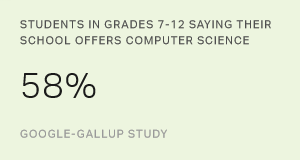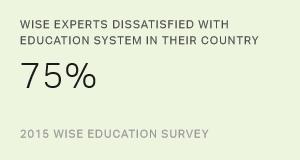President Barack Obama announced on Jan. 30 a new initiative calling for $4 billion to expand computer science education in public schools, emphasizing that students need this "new basic" skill to be prepared for careers in our technology-driven world. If Congress approves the president's budget request, this initiative could help fill a significant need uncovered in a recent Google-Gallup study.
Organizations across the country struggle to meet the incredibly high demand for workers with computer science skills. To better understand this problem, Google and Gallup teamed up in 2014 to measure U.S. students' exposure to computer science. This study revealed a wide disconnect between the demand for computer science education from parents, teachers and students versus the schools providing it.
Nine in 10 parents surveyed say that offering opportunities to learn computer science is a good use of resources at their child's school, a statistic cited in the announcement from the White House. Yet many students lack access to computer science learning. Fewer than six in 10 students (58%) in grades seven to 12 say their school offers classes dedicated to computer science. One in four students report having no access at all to a computer science group or club. And black and lower-income students are less likely than other students to have access to computer opportunities in school.
Even when schools report offering computer science courses, many don't provide the advanced skills needed to be ready for a job. Three in four principals surveyed say that their school does not offer computer science classes with programming/coding, which are the skills needed to create software, apps, games, websites and electronics. Only 21% of principals surveyed from schools that offer computer science classes say Advanced Placement computer science courses are available at their schools.

This research clearly shows that the president's initiative could go a long way toward solving a significant computer science access problem that could have important implications for our country's future. Unlocking the voices of America's most precious constituents in education -- parents, teachers and students -- provided the groundwork for this policy solution. The power of amplifying their voices through well-done, objective research is tremendous.
We need to repeat this "data-driven solutions" model every time. Whether it is closing gaps in computer science education, increasing freedom worldwide, reducing food insecurity or improving the lives of those with disabilities, the solutions needed to solve the world's most pressing problems start with gathering unbiased and robust data. Leaders need reliable data to understand problems before they can solve them. And the voices of constituents provide the most powerful insights.



